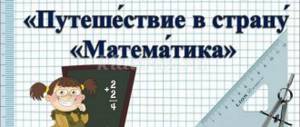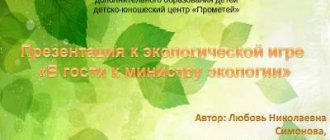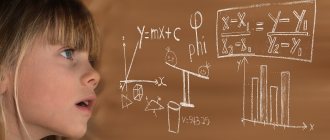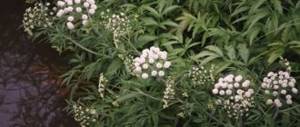MAGAZINE Preschooler.RF
Quest - game "Young ecologist"- Vulakh Elena Nikolaevna senior teacher
- Aroyan Suzanna Vanikovna teacher
MADOOU TsRR No. 8 Kurganinsk, Kurganinsk
EXPLANATORY NOTE
Environmental education is one of the priority tasks in educating the younger generation. Environmental education of preschoolers has recently become more relevant due to the increased human influence on the natural world. In kindergarten, everything is important: setting up groups, walking areas, organizing a corner of nature, carrying out work in the system to familiarize with the outside world.
The main goal of our kindergarten is to educate a socially active, creative personality, capable of loving and caring for nature, and treating the world around us with care.
We try to structure educational activities in such a way as to answer questions that interest children, introduce children to systematic creative and mental activities, and also ensure that they acquire the necessary knowledge.
One of the interesting areas of work for educators was conducting quest games. Here, children have ample opportunities for mental activity, experimentation, application of acquired knowledge, creativity and the ability to build their activities in a team.
Goal: Formation of ecological culture of children of senior preschool age.
Tasks:
- Systematize children's knowledge of ecology. To form a holistic understanding of natural phenomena, the interrelations of objects of living and inanimate nature.
- Develop the ability to analyze the content of questions and riddles and give a complete meaningful answer to them.
- Develop the ability to work in a team and follow the rules of the game.
- Cultivate love for native nature.
PROLOGUE: briefing
Presenter: Hello, children! Hello, dear adults. Hello, everyone who is present today at our quest - a game called “YOUNG ECOLOGIST” !
Our game will not be an ordinary one, but a game - a journey through the territory of the kindergarten. All you need to take with you is a good mood and good luck. Today you can show and prove that you are real defenders of nature.
To pass all the tests with dignity, you need to split into two teams. To do this, I propose to draw lots. Each of you will take an emblem from this chest. And then he will quickly find his like-minded teammates using the same emblem.
Draw: blue or green emblems according to the number of children in the group (teams: Blue and Green).
Presenter: Now that you have divided into teams, you will find out how our quest will go.
Both teams will start the journey at the same time and complete the same tasks. They will simply go in different directions: Green to the right, Blue to the left (according to the location of the exits from the music hall).
Each team will have a map. Using it as your guide, you will enter different rooms of the kindergarten and receive assignments. The task must be completed on time (hourglass)! For correct and quick execution, a reward will be given - one puzzle. You will then use them to create an environmental poster.
When we gather in this hall again and collect an environmental poster, we will be able to open a magic chest! The winners will receive a reward!
You are ready? Begin!
PROGRESS OF THE QUEST:
Task 1: “Colors of nature” (in the art studio)
Progress of the task: showing the process of mixing paints and obtaining orange, pink and purple colors.
Task 2: “Clean water” (in the preparatory group)
Conducting an experiment on water purification: Each of the children chooses a filter (cotton wool, paper filter, cotton pads, gauze) and places it on an empty, clean container. Pours contaminated water through the filter. Observes the result and draws logical conclusions.
Task 3: “Migratory and wintering birds” (in a speech therapy group)
Progress of the task: showing cards with images of migratory and wintering birds. Children recognize the birds and voice their decision. During the show, the emphasis is on wintering birds of the Krasnodar region (rook).
Task 4: “Natural materials: a wonderful bag”
(in the psychology room)
Progress of the task: each of the children takes turns determining by touch the material of the object located in the “wonderful bag” .
Task 5: “Animals of the Red Book” (in the senior teacher’s office)
Progress of the task: classify endangered and non-endangered animals using animal figures, distribute them into different containers.
Task 6: “The Web” (in the older group)
Progress of the task: climb through the “web” (ropes in different directions) without touching the bell.
Task 7: Experiment “Why is oil dangerous?” (in the middle group)
Conducting the experiment: Pour oil into a container with water (vegetable oil, painted black), throw in a feather. The feather became heavy, the hairs stuck together. What could happen to birds if unexpected pollution of water bodies, rivers, and seas with oil occurs? — They may die (picture) because birds caught in an oil slick contaminate their feathers. They stick together and lose their ability to repel air. And the birds die.
General fee. Action “Collect garbage” (in the music hall)
Progress of the task: Food boxes, bags, packaging are scattered on the floor. Invite the children to tell what happened and what should be done in this case. To bring to an understanding of the global problem of solid waste disposal.
EPILOGUE OF THE QUEST
Presenter (reflection): You have all passed the test. Have you completed all the tasks? What were the difficulties? What do you remember most? How do you understand: what is ECOLOGY?
Children make environmental posters from puzzles.
Presenter: I'm ready to bring in the chest! (Opening a chest with medals: “Defender of Nature” ).
I picked a flower and it withered.
I caught a butterfly, and it died in my palm.
And then I realized that you can only touch nature with your heart!
Flash mob “Defenders of Nature” .
Presentation of medals.
| Next > |
Ecological quest “Nature of the schoolyard” (for primary school students)
Goal: to create conditions for the formation of an active life position in the younger generation, awareness of citizenship, readiness to participate in solving environmental problems and popularization of a healthy lifestyle through active participation in socially significant activities.
Tasks:
- Creation of a unified educational and educational space through quest technologies;
- Popularization of a healthy lifestyle;
- Motivating participants to make independent decisions to effectively use the capabilities of the modern information educational environment;
- Forming a team spirit when solving a creative problem, choosing methods for its implementation while overcoming difficulties that arise in the process of solving it;
Ecoquest progress
- Organizing time
Guys ! Today we are setting off on a unique, very interesting and educational journey through... the school yard. Along the way, you will need knowledge and ingenuity, friendship and resourcefulness, speed and accuracy in completing tasks. As with any hike, you should help each other and not blame others for failures and mistakes. Act together, have fun and good luck will accompany you. The winner will be the one who is friendlier, more active and shows the best knowledge.
- Introduction to the rules of the game:
You have to pass tests in the form of a quest.
-What is a quest?
Quest
this is an adventure, usually a game one, during which participants need to go through a series of obstacles to achieve some goal.
- Introduction to the game situation.
2017... world has gone mad! The planet cannot come to terms with such an appeal to nature! Devastation, dirt, polluted air….. nothing can save the Earth… EXCEPT…. there is one SECRET! The secret is hidden far, far away... only one elder knew about his whereabouts... He wanted to help people and sent his message to earth!
Yes, that's the problem! A strong wind blew pieces of the map all over the school yard. Guys, find and learn the SECRET that will help save the Earth! Save us!
Guys! Are you ready to prevent a disaster?
Your task: collect 5 pieces of the map, fold them and find out the SECRET of saving the EARTH!
A route sheet will help you. There are clues as to the supposed location of the fragment of the map.
Forward!
- Game tasks
First
you will find a fragment in the place where it grows...
Mystery
Tell me, from which tree did the green hedgehog fall? He rolled to the side, but didn’t run into the forest.
Second
The fragment is located near the evergreen tree. It has healing properties. The resin released by wood creates a persistent, pleasant odor. Wise people noticed that medicinal oil and infusions can be prepared from the fruits and needles of the tree. Near these trees, even the air is cleaner. Wood-boring beetles and moths are afraid of the smell of wood, which is why in ancient times the most valuable books were kept in caskets made from this wood. And not only caskets were made from wood, but also icons and figurines. Even ships. What is the name of this tree?
Third
The wind carried the fragment onto the branches of a young tree. On the watch at the main entrance to the school, an envelope with a hint is waiting for you. Guess on the branches of which tree there is a piece of a map?
Fourth
The wind carried the fragment to the area where they grow...
(Hint: find the location of the fragment in this phrase “AND THE ROSE FALLED ON AZOR’S PAW”)
Fifth
the fragment is here: It is always cozy for the birds,
People put grains.
A house without windows, but with a crown,
It's called…………………
- Summarizing
So what is the secret to saving the Earth? Read the message of the wise old man.
People, protect nature, be its friends and defenders. Be an example of the right attitude towards the world around you, strive to learn the laws of nature, its secrets and features. In nature, be quiet and modest, do not destroy plants, become friends with all animals. Protect springs, streams, rivers, ponds. Take care of the cleanliness of the environment.
Nature is our wealth!
V. Sukhomlinsky also wrote: “A man became a man when he heard the whisper of leaves and the song of a grasshopper, the murmur of a spring stream and the ringing of the silver bells of a lark in the bottomless summer sky, the rustle of snowflakes and the howling of a blizzard outside the window, the gentle splash of a wave and the solemn silence of the night - he heard and, with bated breath, listens for hundreds and thousands of years to the wonderful music of life. Know how to listen to this music, know how to enjoy the beauty.”
See you again!
Third
you will find a fragment in the place where it grows...
Riddle
Tell me - from which tree did the green hedgehog fall? He rolled to the side, but didn’t run into the forest.
Second
The wind carried the fragment onto the branches of a young tree. On the watch at the main entrance to the school, an envelope with a hint is waiting for you. Guess on the branches of which tree there is a piece of a map?
The fifth
fragment is located at the evergreen tree.
It has healing properties. The resin released by wood creates a persistent, pleasant odor. Wise people noticed that medicinal oil and infusions can be prepared from the fruits and needles of the tree. Near these trees, even the air is cleaner. Wood-boring beetles and moths are afraid of the smell of wood, which is why in ancient times the most valuable books were kept in caskets made from this wood. And not only caskets were made from wood, but also icons and figurines. Even ships. What is the name of this tree? First
The wind carried the fragment to the area where they grow... (Hint: find the location of the fragment in this phrase “AND THE ROSE FALLED ON AZOR’S PAW”)
Fourth
the fragment is here: It is always cozy for the birds,
People put grains.
A house without windows, but with a crown,
It's called…………………
Competition “Lesson on ecology and energy saving #Brighter together”
Methodological development of extracurricular activities
Topic: “Together brighter!”
Explanatory note
Form of implementation: Ecological quest
Type of development: Author's
Target audience: students in grades 5-7 (11-13 years old)
Planned results of the event:
- Students use electricity, heat, and water resources with care;
- Know the rules for safe handling of household electrical appliances;
- They know about the energy profession and respect the work of energy workers and utility workers;
- Participate in environmental protection and energy saving measures;
- Prepare for an informed choice of educational profile and future profession.
Place in the educational process: part of a series of events dedicated to environmental protection and informing students about the features of various fields and types of professional activity.
In the course of carrying out a collective case, a group organizational form , gaming technologies , and practical work are used.
Characteristics of organizational forms used to conduct classes:
- A quest game designed as a small group competition;
- Practical work according to instructions.
Indicators for assessing planned educational results:
- Participants name ways to economically consume electricity, heat, and water at home and in production.
- Participants name the rules for safe handling of household electrical appliances;
- Participants name professions that help us save different types of energy.
As a result of participation in the event, participants additionally have the opportunity to develop conversation skills, the ability to find and record the necessary information, present the results of their work, the ability to listen and answer questions, work in a team, and carry out tasks according to instructions.
A form of evaluation is observing the presentation of team work results.
Time: 60 minutes. Of these, 40 minutes are quest games, 20 minutes are practical work.
Equipment: 8 cardboard tubes, scissors – 4 pcs., tape – 4 pcs., napkins – 4 pcs., 4 glass jars with lids, 4 boxes with blue and green tokens, sheets with assignments, envelopes for assignments, paper baskets 8 pieces, paper blanks of proverbs, 4 Whatman paper, magnets, felt-tip pens, presentation, projector, emblems for participants with the inscription “#BrighterTogether”, gowns according to the number of participants, kits for conducting a physical experiment - according to the number of teams, sweet prizes.
Form of public presentation of results: design of the final stand.
The event consists of 2 blocks:
- block - Quest - game;
- block – Practical work.
Goal: to develop in schoolchildren the habit of caring for electricity, heat, natural resources, respect for the work of power engineers, and the ability to safely use household electrical appliances.
Tasks:
- to intensify the cognitive activity of students, develop the creative and technical abilities of children;
- repeat the rules for safe handling of household electrical appliances.
- encourage children to participate in energy saving activities.
- to form a readiness to consciously choose a training profile.
Stages of the quest game:
- Motivational stage.
- Stage of updating knowledge.
- The stage of applying knowledge and skills.
- Reflection
Progress of the game.
Students choose emblems and split into 4 teams.
1. Motivational stage (3 minutes).
Host: Hello, today we have an unusual activity - an environmental quest. Quest is a team game that involves not only erudition, but also ingenuity, creativity and out-of-the-box thinking. The idea of the game is simple - teams, being in a specially equipped room, perform various tasks.
During the game, you will collect words, which should ultimately form a proverb on the topic of our game. The first team to complete the task correctly chooses a sign with a word from the proverb. The team that finishes the task second receives a blue token, the third team receives a green token. One word from the proverb at the end of the quest game can be “bought” for one blue token, or for two green ones.
Slide No. 1. Presenter: To determine the theme of the quest, let's watch an excerpt from the cartoon: https://www.youtube.com/watch?v=9KCxIoGpQek (54 sec.).
2. Stage of updating knowledge (2 minutes).
Host: So what is the topic of our quest? Yes, of course, energy saving. Today, people all over the planet consume enormous amounts of energy. For the operation of various enterprises, coal, gas, and oil are needed as an energy source. The extraction of these minerals requires large economic costs and harms the environment. In order to preserve nature, it is necessary to reduce energy consumption. By economically using any type of energy, we preserve the environment and save money.
The earth gives a person a lot of warmth, energy, and goodness. And so that no one forgets that the resources of our planet are not endless, people began to organize protests. There is a bird day, a cleanliness day, a water saving day. And November 11th is Energy Saving Day.
From September 2 to November 23, 2020, the first All-Russian Energy Saving Festival #BrighterTogether was held in all regions of the country - an event to attract the attention of Russian residents to the issues of caring for energy resources and the use of modern energy-efficient technologies in everyday life and in production.
These events are a unique opportunity to remind humanity of the importance of caring for electricity, heat, natural resources, respect for the work of energy workers, for the environment and development of society, for maintaining life on our planet. We dedicate our game to this topic.
3. Stage of applying knowledge and skills (50 minutes).
Progress of the lesson:
1 block: Quest game (30 minutes).
Slide No. 2, 3. Presenter: To determine the first task, guess the riddles placed on the presentation slide:
When you think of it, you test yourself, when you guess it, you get joy!
(mystery)
Those whose minds are in order, those who are easy...;
(puzzles)
Presenter: Find the envelope with the task on the table and complete it. Post the result on the board. Let's check. Choose a sign with a word from a proverb or tokens.
Task 1: “RIDDLE” (5 minutes)
Guess any three riddles on the topic “Electrical Appliances”.
The house is a glass bubble, And a light lives in it, During the day it sleeps, And when it wakes up, It will light up with a bright flame.
(Lamp.)
*** In winter he eats a lot, and in summer he sleeps a lot; The body is warm, but there is no blood.
(Bake.)
*** Four blue suns In grandma’s kitchen, Four blue suns Burned and went out. The cabbage soup is ripe, the pancakes are sizzling. No need for sun until tomorrow.
(Gas stove.)
*** In our house under the window there is a hot accordion: It doesn’t sing or play - it heats the house.
(Heating radiator.)
*** A voice emerges through the field and forest. He runs along the wires. If you say it here, you can hear it there.
(Telephone)
*** I puff, puff, puff, I don’t want to get warm anymore. The lid rang loudly: “Drink tea, the water has boiled!”
(Electric kettle)
*** It will blink, blink, dive into the bubble, into the bubble under the ceiling, at night in the room for a day!
(Electric lamp)
*** Past the Grove, Past the Yar, Rushing Without Smoke, Rushing Without Steam, the Steam Locomotive's sister. Who is she?…
(Electric train)
Slide No. 4. Presenter: To complete the next task, solve the puzzle on the presentation slide. Find this item on the table and the task in it. Complete the task and post the result on the board. Let's check. Choose a sign with a word from a proverb or tokens.
1=Z (basket)
Task 2: “DIVIDE INTO GROUPS” (5 minutes)
Game rules: collect pictures with objects in a basket, sorting them by the questions “What warms a person?” and “What keeps you warm?”
Stove, fur coat, fireplace, sweater, scarf, fire, sun, blanket, battery, hat.
Slide No. 5. Presenter: To complete the next task, look at the presentation slide and use the clues to determine its essence. Complete the task and post the result on the board. Let's check. Choose a sign with a word from a proverb or tokens.
Task 3: “SECRET MESSAGE” (5 minutes)
Using the code, guess the word.
(fridge)
Host: What rules must be followed when using this electrical appliance in terms of energy saving?
Suggested answers: do not keep the refrigerator door open for a long time; do not place food that has not cooled down, do not place the refrigerator next to a radiator, etc.
Slide No. 6. Presenter: To complete the next task, look at the presentation slide and use the clues to determine its essence. Complete the task. Post the result on the board. Let's check. Choose a sign with a word from a proverb or tokens.
Task 4: “FIND A PAIR” (5 minutes)
Participants in the game find an envelope with pictures and a task on the table. Find pairs of pictures, stick them on a piece of paper, and explain your choice.
| Antique items | Modern electrical appliances |
| Iron - | Electric iron |
| Broom - | Vacuum cleaner |
| Frying pan - | Pancake maker |
| Samovar - | Electric kettle |
| Mortar - | Coffee grinder |
| Curlers - | Curling iron |
| Bake - | Microwave |
| Candle - | Bulb |
Slide No. 7, 8. Presenter: To complete the next task, look at the presentation slide and use the prompts to determine its topic. Team representatives select the note that encrypts the location of the envelope with the task:
Team 1: p——e m—o u——i (teacher’s workplace).
Team 2: w—f s—a, p—a 2 (cabinet on the left, shelf 2).
Team 3: S—a at o—a, p—a with c——m (wall by the window, shelf with a flower).
Team 4: P—and at d—and in l———th (desk at the door to the laboratory)
Task 5: “PANTOMIME” (5 minutes)
In the jars the task is to show with gestures and facial expressions:
- a light bulb that gradually lights up and burns out;
- electric iron from the moment it is turned on until it cools completely;
- a kettle that is gradually heated on the stove until it boils;
- a TV that gradually turns on, works, and turns off.
Teams guess what was shown and name the rules for safe handling of this electrical device.
Presenter: Complete the task, post the result on the board. Let's check. Choose a sign with a word from a proverb or tokens.
Slide number 9. Presenter: Homework for the next biology lesson! Count how many light bulbs there are in the house. Write down what electrical appliances your family uses. Prepare a message about how your family saves energy.
Task 6: “ECOLOGICAL COMPETITION” (5 minutes)
Knowledge of the basics of ecology is of great importance for modern people. Ecology is the science of the connection between living things and the environment. Ecologists identify problems connecting human health and life with the state of the environment and propose ways to solve these problems. Imagine yourself as a carrier of this profession and name the rules that a person must follow when participating in energy saving (electricity, water, heat):
(team number 1) What needs to be done in order to save electricity? Suggested answer:
- Always turn off the lights when you leave a room or home.
- Do not turn on many electrical appliances and do not leave them on in vain.
- Do not turn on the lights when it is light or sunny.
- Replace light bulbs with energy-saving ones.
- Regularly check the cleanliness of lamps, shades, and windows.
- Unplug electrical appliances at night.
- Install a counter.
(team No. 2) What needs to be done to save heat?
Suggested answer:
- Free up space around radiators.
- Close the doors of rooms and apartments, entrances tightly.
- We retain heat on the balcony by glazing the balcony.
(team No. 3) What needs to be done to save water?
Suggested answer:
- Choose a shower over a bath.
- Reduce your time in the shower.
- Only run the dishwasher when fully loaded.
- Run only a filled washing machine.
- Fix the leak.
- Turn off the tap while brushing your teeth or washing dishes.
(team No. 4) How can schoolchildren participate in energy saving?
Suggested answer:
- Always turn off the lights when you leave the office.
- Close the water tap.
- Close the doors behind you.
- If necessary, cover windows.
Slide number 10. Presenter: Guys, do you know what a treasure is? Now you are given the opportunity to become treasure hunters. However, instead of treasures, you will find a treasure with the text of the next task. Good luck!
To complete the next task, you need to find jars with a sticker of a certain color in which the text is hidden.
Find the jars and complete the task. Let's check. Choose a sign with a word from a proverb or tokens.
Block 2: Practical work (20 minutes)
Slide number 11 . Task 7: “PRACTICAL WORK”
Host: In our lives there are many professions that are related to energy. Energy workers supply light and electricity to our homes. City workers: mechanics and electricians service our homes and repair damage to pipes and electrical wiring. Without these professions, the city will not be able to live fully. The work of people in these professions is not easy, but very honorable. In order to master these professions, knowledge of such subjects as mathematics and physics is required.
Slide number 12 . I invite you to our laboratory to gain the first skills of these professions.
Practical task 1: A pipe burst. In front of you is a special pipe tape, scissors and a towel. How to properly fix the problem? Water was dripping from the pipe, do you need to fix the pipe urgently? Or can I wait a week and nothing bad will happen? Correct answer: A faulty tap can “drip” many liters of water in just one day! We must try to close the tap tightly and fix problems as soon as possible. (before repairing the damage, you need to wipe the pipe with a napkin).
Practical task 2: Following the text of the instructions, assemble an electrical circuit.
Instructions




